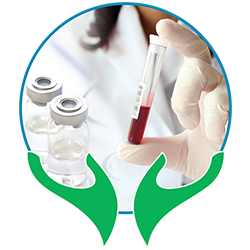-
 Creatinine
Creatinine Creatinine - Parameters: 1
The test most frequently used to evaluate renal function is the creatinine assay in serum or plasma. A byproduct of creatine phosphate breakdown in muscle, creatinine is typically produced by the body at a fairly steady rate (dependent on muscle mass). Under normal circumstances, it is not significantly reabsorbed by the tubules after being freely filtered by the glomeruli. Additionally, a tiny but substantial amount is actively secreted.
-
 Glucose
Glucose Glucose - Parameters: 1
The primary carbohydrate found in peripheral blood is glucose. The body's primary source of cellular energy is the oxidation of glucose. Dietary glucose is transformed into either fatty acids or glycogen, which are then stored in the liver and adipose tissue, respectively. Many hormones, the most significant of which are generated by the pancreas, regulate blood glucose content within precise bounds. Hyperglycemia is most commonly caused by diabetes mellitus, which is a lack of insulin secretion or activity. Elevated blood glucose is also caused by a number of secondary causes. Pancreatitis, thyroid issues, kidney failure, and liver illness are a few of these. Hypoglycemia is not as commonly seen. Low blood glucose levels can result from a number of disorders, including insulinoma, hypopituitarism, and insulin-induced hypoglycemia. Diabetes mellitus and idiopathic hypoglycemia are two illnesses of carbohydrate metabolism that are treated and diagnosed using glucose levels. Measuring the amount of glucose in urine can help in diabetes management, evaluation of glucosuria, detection of renal tubular abnormalities, and diabetes screening.
-
 Lipid Profile
Lipid Profile Lipid Profile - Parameters: 6
Lipid Profile
-
 Urea
Urea Urea - Parameters: 1
The main byproduct of protein nitrogen metabolism is urea. It is created in the liver via the urea cycle from ammonia, which is created by the deamination of amino acids. The majority of urea excretion comes from the kidneys, but small amounts are also expelled through perspiration and broken down by bacteria in the intestines. The most used test for screening renal function is blood urea nitrogen determination. It can help with the differential diagnosis of prerenal, renal, and postrenal azotemia when combined with serum creatinine measurements. Blood urea nitrogen concentrations are elevated in renal-related conditions such as tubular necrosis, glomerular-nephritis (renal causes), shock, reduced blood volume, chronic nephritis, nephrosclerosis, and urinary tract blockage (postrenal causes). Additionally, transient spikes may be observed during times when protein intake is substantial. Liver illnesses are characterised by unpredictable levels.










